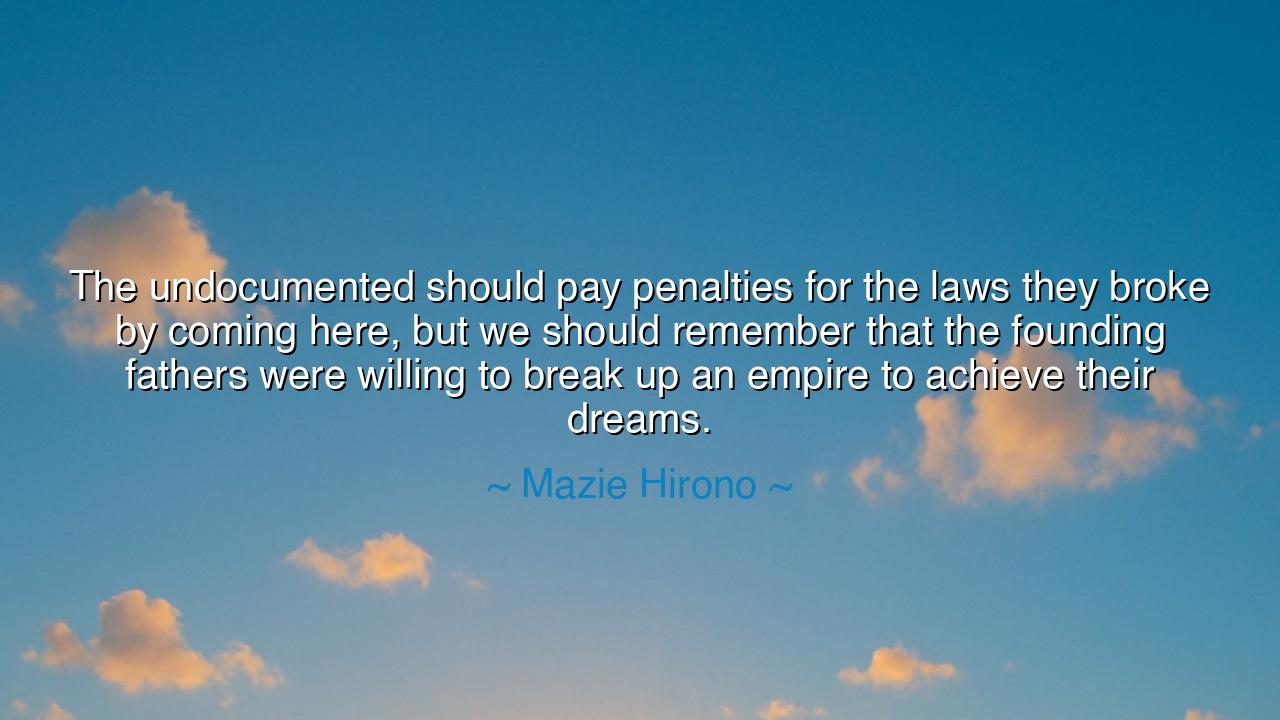
The undocumented should pay penalties for the laws they broke by
The undocumented should pay penalties for the laws they broke by coming here, but we should remember that the founding fathers were willing to break up an empire to achieve their dreams.






When Mazie Hirono declared, “The undocumented should pay penalties for the laws they broke by coming here, but we should remember that the founding fathers were willing to break up an empire to achieve their dreams,” she spoke with the wisdom of one who sees not only the letter of the law, but the spirit of humanity that breathes beneath it. Her words bridge two worlds: the world of justice and the world of mercy, the world of nations and the world of dreams. They remind us that while laws are the bones of civilization, it is dreams that give it life. To understand this truth is to see the eternal struggle between order and aspiration, between obedience and freedom—a struggle that has shaped every age since the dawn of human history.
The origin of this quote arises from the modern debate over immigration in the United States, a land born from both law and rebellion. Senator Hirono, herself an immigrant who journeyed from Japan as a child, understands intimately the yearning that drives people to cross oceans and borders in search of a better life. In her words, there is no denial of law’s authority—she acknowledges that those who come without permission have broken the rules of the land. Yet she places this truth in its larger context: that the pursuit of dreams has always demanded sacrifice, disobedience, and courage. Her comparison to the founding fathers is not a political argument, but a moral reminder—that America itself was founded by those who broke the law of empire to build something greater.
When she invokes the founding fathers, she calls upon the spirit of 1776, that fiery moment when ordinary men chose defiance over obedience, risking their lives for the sake of liberty. They were, in the eyes of the British Crown, rebels and traitors, violators of the law. Yet history remembers them as visionaries, whose disobedience birthed a nation. Hirono’s message is that we must not forget this paradox—that every great movement of progress, every birth of freedom, begins with an act that challenges authority. The question, then, is not simply who breaks the law, but why they do so. Some break laws out of greed or malice, but others, like the immigrants she defends, are driven by hope—the same hope that once lit the fires of revolution.
The ancients, too, understood this sacred tension. Socrates, when condemned unjustly, obeyed the law and drank the poison, yet it was his followers—Plato, Aristotle, and countless others—who transformed his sacrifice into a revolution of thought. Likewise, Moses, defying the power of Pharaoh, led his people through the wilderness toward a promised land. These stories remind us that law alone does not define righteousness; justice is higher than legality, and mercy is greater than vengeance. Hirono’s words carry this echo from antiquity: that a people must never forget compassion, for the highest form of justice is not punishment, but understanding.
Consider, too, the story of Ellis Island, where millions of immigrants once stood, trembling but hopeful, seeking entry into a new life. Many came poor, ill, or unprepared, yet the nation received them and was enriched by their labor and love. Their dreams became the engines of progress. Now, in the age of division and suspicion, Hirono’s words remind us that the dreamers of today—those called undocumented—are no less human, no less worthy of hope. To recognize their humanity is not to erase the law, but to balance it with grace, as the founders once balanced rebellion with vision.
In her wisdom, Hirono does not call for an abandonment of justice. She says, “They should pay penalties,” for responsibility is the root of freedom. Yet she demands that we remember the moral lineage of our nation—that America’s strength has always come from those who dared to dream beyond the boundaries imposed upon them. The founders defied empire; immigrants defy despair. Both are seekers of light. Her words call us to see this reflection—that the immigrant’s journey is a continuation of the American story itself, written not in bloodlines but in courage and conviction.
The lesson, then, is this: law and compassion must walk hand in hand. A nation that honors its laws but forgets its heart loses its humanity; a people that honors compassion but forgets order invites chaos. The wise must build bridges between justice and mercy, between the security of the state and the dignity of the soul. Every generation must ask itself: do we guard our borders out of fear, or do we guide our conscience by love?
So let these words of Mazie Hirono be carried forward as a teaching for all ages: do not judge the dreamer too swiftly, for the dreamer is the wellspring of progress. Remember that even the greatest laws were once broken to serve a higher truth. Stand firm in justice, but keep your heart open to compassion. For the destiny of a nation is not measured by how it punishes those who reach its gates, but by how it honors the spirit of those who still believe in its promise.






AAdministratorAdministrator
Welcome, honored guests. Please leave a comment, we will respond soon